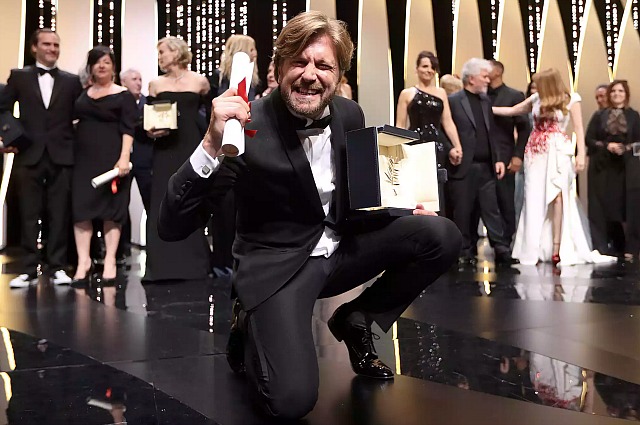Last night’s Palme d’Or win by Ruben Ostlund’s The Square, a dry, sharply-ordered satire of political correctness in Sweden (which I called “a serving of deft, just-right comic absurdity”), was fully deserved. I would have voted for Andrey Zvagintsev‘s Loveless, a brilliant missing-child melodrama that won high praise from nearly every Cannes-visiting critic, but it only managed a third place showing — i.e., the Jury Prize. This isn’t a tragedy (it was celebrated), but it wasn’t appropriate either. I blame the usual political agendas.

The Square director Ruben Ostlund at the conclusion of last night’s Cannes Film Festival awards ceremony.
The 2014 Cannes jury shafted Zvyaginstev’s Leviathan with a piddly screenwriting award, and now another Cannes jury has delivered a similar message. Loveless should have at least won the Grand Prix, but that award went to Robin Campillo‘s BPM (Beats Per Minute), a impassioned, seriously didactic period film (i.e., early ’90s) about Parisian ACT UP members battling bureaucratic indifference and/or foot-dragging in the battle against AIDS.
BPM is a commendable (i.e., thumbs up but less-than-great) film, but the Grand Prix win, trust me, was largely about jury president Pedro Almodovar pushing a film with a progressive gay agenda. Pedro wanted this and the jurors went along.
I’m also blaming the inappropriate Jury Prize win for the Zvyaginstev on the feelies — i.e., jury members who wanted to honor films that supplied up vibes and socially constructive messaging, which the gloomy Zvyagintsev film couldn’t quite accommodate. I don’t know for a stone fact that Will Smith was a prominent voice among the feelies, but how could I not at least suspect this? Look at the movies he’s chosen to do over the last 20-plus years…good God.
The impetus for handing the Best Director prize to The Beguiled‘s Sofia Coppola was, I’m guessing, almost entirely a progressive-female-agenda thing. (I don’t know that jury member Jessica Chastain was pushing for this, but it would have been odd if she’d been neutral…c’mon.) The Coppola trophy was almost certainly inspired by the fact that the last time a Cannes jury gave their Best Director trophy to a woman was in 1961, when Soviet filmmaker Yuliya Solntseva won for The Chronicle of Flaming Years.
I’m saying all this because The Beguiled is far from brilliant or audacious. It’s just a slightly better-than-decent remake of Don Siegel‘s 1971 original — nothing more than that.
As I wasn’t able to see Fatih Akin‘s In The Fade or Lynne Ramsay‘s You Were Never Really Here, I’ve nothing to say about their respective stars, Diane Kruger and Joaquin Phoenix, winning the Best Actress and Best Actor prizes. I can, however, pass along the view of a fellow journo who thought Ramsay’s film was unappealingly violent (he feels it should have been called It’s Hammer Time) and that Phoenix’s performance as a pot-bellied, revenge-obsessed dude was…well, what it was.
The jury gave the Best Screenplay award to both Yorgos Lanthimos and Efthimis Filippou‘s The Killing of a Sacred Deer (an absurd call if you ask me) and Ramsay’s extremely bloody You Were Never Really Here.
The Camera d’Or, given to the jury’s idea of the best first film from any section of the entire festival, went to Leonor Serraille‘s Jeune femme.
Smith and Chastain aside, the Almodóvar jury included Toni Erdmann director Maren Ade, Chinese actress Fan Bingbing, South Korean director Park Chan-wook, Italian helmer Paolo Sorrentino and French composer Gabriel Yared.












